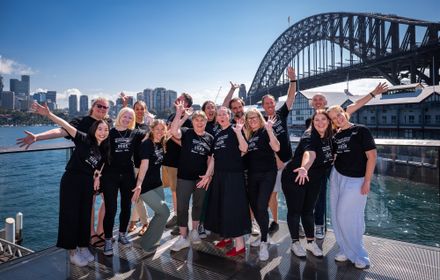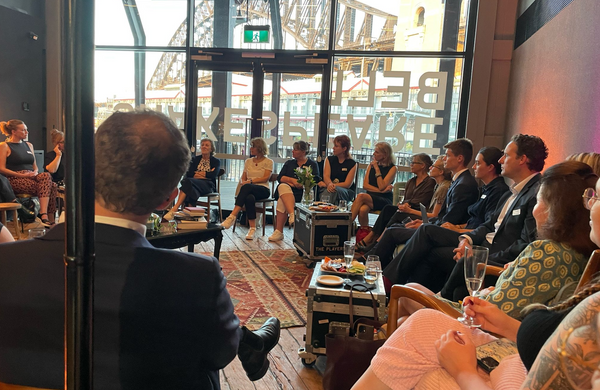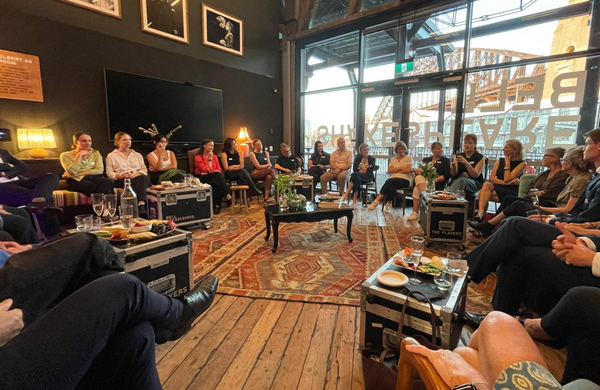
Education
National Teacher Mentorship Impact Research Report
14 Mar 2025
Loneliness is the penalty of leadership, but the man who has to make the decisions is assisted greatly if he feels that there is no uncertainty in the minds of those who follow him, and that his orders will be carried out confidently and in expectation of success.
― Ernest Shackleton
On 12 March, Bell Shakespeare launched its new donor circle, Stranger Companies, with an intimate, salon-style discussion centered around our first production of 2025, Henry 5. Joined by Director Marion Potts and Set and Costume Designer Anna Tregloan, the evening took place in our Pier 2/3 Boardroom, dressed with props from our previous productions to turn the space into a French salon. All were encouraged to engage with the provocations, surrounded by familiar faces and strangers alike. The conversation brought several resonant themes to light—from the challenges of leadership and political duplicity to the circumventing of hierarchy and the moral complexities of war. Bringing together both new and longtime theatre lovers, we were proud to actualise Hermia’s desire from A Midsummer Night’s Dream: ‘To seek new friends and stranger companies.’
The discussion kicked off with an insightful introduction from Marion about the turbulent backdrop of the Hundred Years’ War and the immense pressure on King Henry, not only to secure his kingdom’s future but to also to legitimise his reign in the shadow of his father. Our Resident Artist in Education Emily Edwards kicked off the conversation by asking the group to consider the great line ‘Uneasy lies the head that wears a crown’, which speaks to Shakespeare's fascination with leadership—what it requires, what it costs—and to reflect on other leaders in Shakespeare's oeuvre.
Kicking off the discussion, Jane pointed to the ‘absolute’ nature of monarchy in Shakespeare’s time, prompting Abigail to distinguish between being a leader in the absolute and divine sense. ‘Leadership can be bestowed to you, but you have to be worthy of it and choose to be worthy of it’, Abigail suggested. While Richard II saw his entitlement as divinely ordained, King Henry understood that he had to earn his right to lead through action. Iris pointed out that not all of Shakespeare’s leaders wear crowns. Mark Antony in his ‘Friends, Romans, countrymen speech', she said, 'emotionally spurs on his own leadership qualities’. Marion agreed that like Mark Antony, Henry is ‘learning on the job’. ‘The intersection between Henry’s personal and public agendas are fascinating. When acting under a lot of pressure, decisions having to be made in the blink of an eye. Henry doesn’t have time to weigh up the pros and cons; he acts on instinct.’


The conversation then focused on the nature of Henry’s duplicity—how he achieves his ends through dishonest means. Driven by his personal grievances and threats to his campaign, King Henry disguises himself as a common man and becomes aware of the soldiers’ mistrust and growing disillusionment with the war.
‘And that’s politics!’ Andrew laughed. ‘That politicians believe what they say is not the complete story.’ Andrew drew a parallel between corporate and political leaders. In the corporate world, dishonesty often leads to consequences; yet, in politics, the stakes are different—duplicitous behaviour is not only common but often necessary for political survival. Whether for good or bad means, leadership is, inevitably, a 'performance’. Emily asked the group if we should judge politicians for this.
Jane then posed a fascinating question: ‘If you're in a position of leadership and power, how do you access information that isn't filtered through the hierarchy?’ This struck a chord with Lisa who explained that, despite the difficulties of doing so, leaders must circumvent the hierarchy to access the truth. But even with this information, Lisa, added, it's still a delicate balance of total authenticity and duplicity. Annie shared that the scene where the King speaks with the soldier affected with her the most. She found herself reflecting on the soldier's decision to refuse the king's money, questioning what Shakespeare had intended that moment to signify, and how it might be received today. ‘There is a great challenge in discovering history afresh, beyond the famous adaptions of the play’, Marion said. 'By maintaining a connection to our contemporary context, we can see these moments with fresh eyes'.


The group then reflected on vulnerability in leadership. Many agreed that vulnerability is challenging in politics, carrying significant risks. Lisa suggested that increasingly, admitting failure has been seen as fashionable, with many leaders being praised for their vulnerability as a sign of leadership. Offering a different point of view, Ruth posed that vulnerability is often not accepted in female leaders. She pointed to recent events involving a female minister, noting how women in politics can face harsher public scrutiny and accountability for their flaws and mistakes. Abigail wondered how much vulnerability is necessary in leadership. Henry's speeches, she added, resonate 'not because they reveal his vulnerability, but because they show him as a complex figure grappling with his purpose. We, as the audience, watch him evolve, and it’s fascinating to observe him screw it up and get it wrong.’ Felipe agreed that in war-torn countries, vulnerability may not even be an option.
The group then revisited questions about morality and war. Marion shared her intention in this production to avoid glorifying war and, instead, to underscore its inherent ambiguity. Andrew reflected on Henry’s decision to invade France, suggesting that, in Henry’s context, no one was immune from being usurped—a nod to Richard II's fate. If Henry didn't take active measures to bring people along, he would risk the survival of his own life, kingship, and national stability. Debra noted that Henry is also not immune from guilt and loneliness. Henry feels a real sense of desperation when confronting the responsibility he carries for these soldiers’ fates.
As a final note Emily asked, ‘Why this play? Why now?’ Anna pointed to the play’s resonances with current global dynamics. ‘When one country or one group of people is demanding ownership—how do we judge our leaders, and what do we judge them on?’ she asked. Marion also acknowledged the contemporary relevance of the play, observing our own geopolitical realities. ‘Shakespeare isn't an end unto itself’, she said. ‘It’s a vehicle for exploring our own society’.
If you are interested in coming to our next discussion and becoming a member of Stranger Companies, please contact our Philanthropy Coordinator, Isabelle Clements at isabellec@bellshakespeare.com.au or on (02) 8220 7523.
You do not need to be a Shakespeare expert to join the conversation.